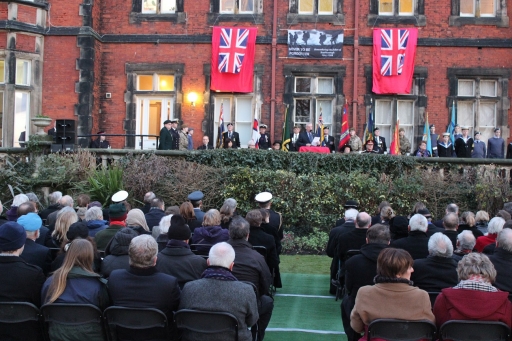On Tuesday, 16th December 2014, the Centenary News editor attended the remembrance event in Scarborough, commemorating the 100th anniversary of the bombardment of the seaside town. Here’s his personal reflections of his visit.
It’s difficult 100 years on to realise how shocking the attack on Scarborough must have been both to local people who lived in the town, and to the UK as a whole.
In 2014, our view of the events of December 16th 1914 is shaped by the knowledge of what followed – the horrific death toll on the First World War battlefields in the ensuing years, and the extensive and brutal aerial bombing of civilian targets by all sides in the Second World War.
Compared to those later events, the bombardment of Scarborough could be viewed almost as a minor event.
But at the time, after only 4 months of war, it had a massive impact.
Before the war, Scarborough was a highly popular seaside resort. The general public had been brought up with the notion that the navy of the British Empire ‘ruled the waves’. And a mainland British target had not been attacked in living memory.
So when a detachment of German warships managed to slip past the British navy, and brazenly and indiscriminately open fire on the town just as daylight broke, it caused widespread disbelief and anger.
The anger has obviously subsided over the years. The speakers at Tuesday’s remembrance events stressed how Germany were now ‘firm friends and allies’. But at the time, it was a major propaganda boost for the British – fuelled by Churchill’s damning description of the German Navy as “the baby killers of Scarborough”, and the recruitment posters proclaiming ‘Remember Scarborough’.
A speaker at Tuesday’s commemorations said that for the people of Scarborough in 1914, “this was our 9/11”. A strong claim, indeed, but one that rings true.
Over 500 shells were fired into the town during the early morning attack, killing 18 people, and damaging over 200 buildings. The casualty figure would have been far higher if the attack had happened later in the day, when the streets, schools and workplaces would have been full and busy.
Before Tuesday’s event, I actually stayed at the Grand Hotel, which itself was badly damaged in the bombardment. It’s a large, prominent building, and one newspaper report said that it was hit 30 times.
The remembrance event itself was organised extremely well – the speeches, the laying of the 18 poppies by local schoolchildren, the reading out of the names, the firing of the maroons, the release of the doves. It all went to plan, and struck the right tone.
One of the organisers told me afterwards that they’d held a lot rehearsals, aware that the occasion would get widespread media attention.
But the careful planning and rehearsals meant that Scarborough marked the centenary of the bombardment professionally, and with dignity and respect.
I have no idea how Scarborough Borough Council is viewed by local people – but they should be proud of the way their Council organised the commemoration of what happened in their town 100 years ago at 8am on December 16th 1914.
